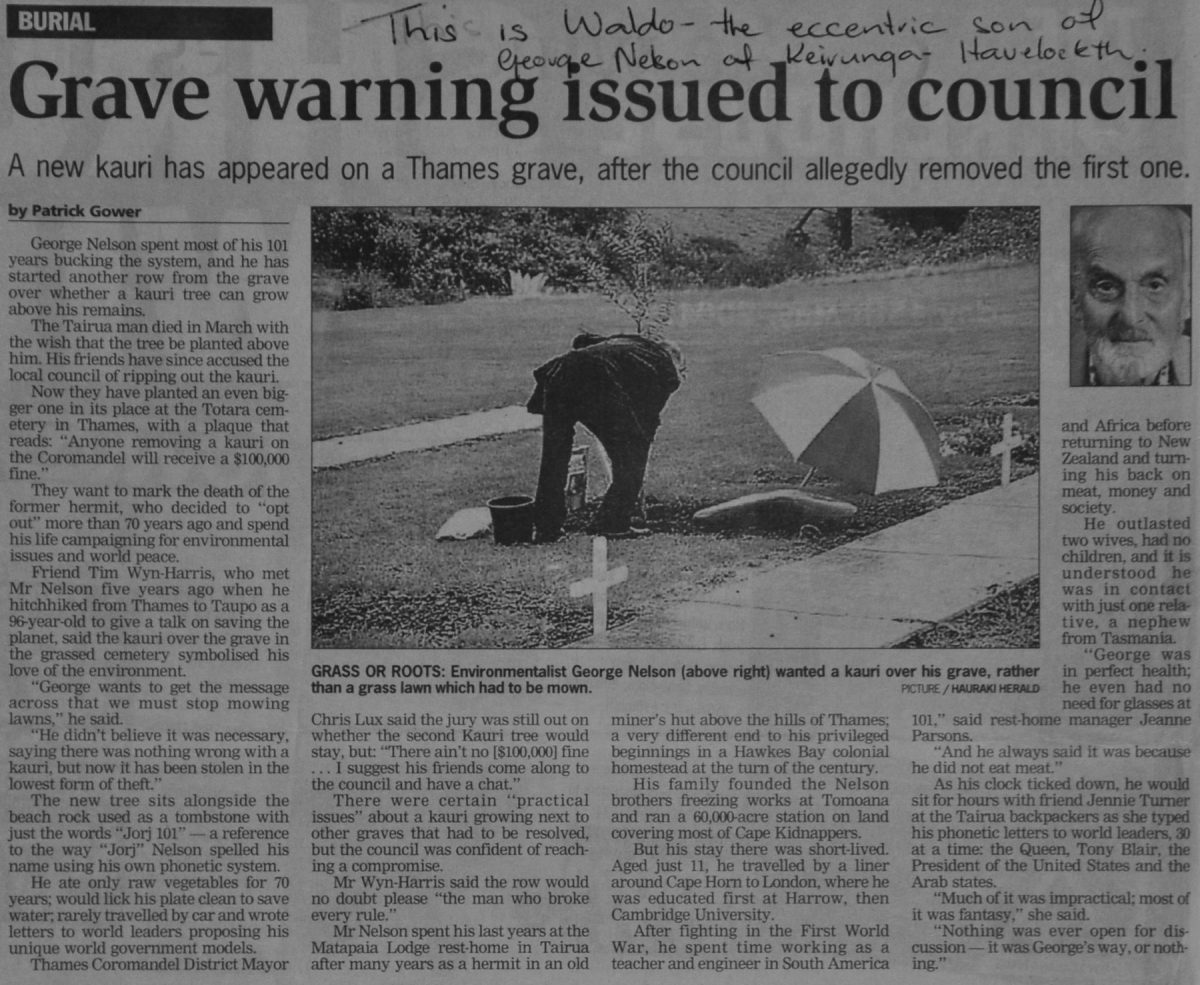WEEKEND NEWS WEEKEND HERALD MAY 12-13 2001
[Handwritten] This is Waldo – the eccentric son of George Nelson of Keirunga Havelock North.
BURIAL
Grave warning issued to Council
A new kauri has appeared on a Thames grave, after the council allegedly removed the first one.
By Patrick Gower
George Nelson spent most of his 101 years bucking the system, and he has started another row from the grave over whether a kauri tree can grow above his remains.
The Tairua man died in March with the wish that the tree be planted above him. His friends have since accused the local council of ripping out the kauri.
Now they have planted an even bigger one in its place at the Totara cemetery in Thames, with a plaque that reads: “Anyone removing a kauri on the Coromandel will receive a $100,000 fine.”
They want to mark the death of the former hermit, who decided to “opt out” more than 70 years ago and spend his life campaigning for environmental issues and world peace.
Friend Tim Wyn-Harris, who met Mr Nelson five years ago when he hitchhiked from Thames to Taupo as a 96-year-old to give a talk on saving the planet, said the kauri over the grave in the grassed cemetery symbolised his love of the environment.
“George wants to get the message across that we must stop mowing lawns,” he said.
“He didn’t believe it was necessary, saying there was nothing wrong with a kauri, but now it has been stolen in the lowest form of theft.
“The new tree sits alongside the beach rock used as a tombstone with just the words “Jorj 101” – a reference to the way “Jorj” Nelson spelled his name using his own phonetic system.
He ate only raw vegetables for 70 years; would lick his plate clean to save water; rarely travelled by car and wrote letters to world leaders proposing his unique world government models.
Thames Coromandel District Mayor Chris Lux said the jury was still out on whether the second Kauri tree would stay, but: “There ain’t no [$100,000] fine … I suggest his friends come along to the council and have a chat”.
There were certain “practical issues” about a kauri growing next to other graves that had to be resolved, but the council was confident of reaching a compromise.
Mr Wyn-Harris said the row would no doubt please “the man who broke every rule.”
Mr Nelson spent his last years at the Matapaia Lodge rest-home in Tairua after many years as a hermit in an old miner’s hut above the hills of Thames; a very different end to his privileged beginnings in a Hawkes Bay colonial homestead at the turn of the century.
His family founded the Nelson brothers freezing works at Tomoana and ran a 60,000 acre station on land covering most of Cape Kidnappers.
But his stay there was short-lived. Aged just 11, he travelled by a liner around Cape Horn to London, where he was educated first at Harrow, then Cambridge University.
After fighting in the First World War, he spent time working as a teacher and engineer in South America and Africa before returning to New Zealand and turning his back on meat, money and society.
He outlasted two wives, had no children, and it is understood, he was in contact with just one relative, a nephew from Tasmania.
“George was in perfect health; he even had no need for glasses at 101,” said rest-home manager Jeanne Parsons.
“And he always said it was because he did not eat meat.”
As his clock ticked down, he would sit for hours with friend Jennie Turner at the Tairua backpackers as she typed his phonetic letters to world leaders, 30 at a time: the Queen, Tony Blair, the President of the United States and the Arab states.
“Much of it was impractical; most of it was fantasy,” she said.
“Nothing was ever open for discussion – it was George’s way, or nothing”
Photo caption – GRASS OR ROOTS: Environmentalist George Nelson (above right) wanted a kauri over his grave, rather than a grass lawn which had to be mown.
PICTURE/HAURAKI HERALD












Do you know something about this record?
Please note we cannot verify the accuracy of any information posted by the community.